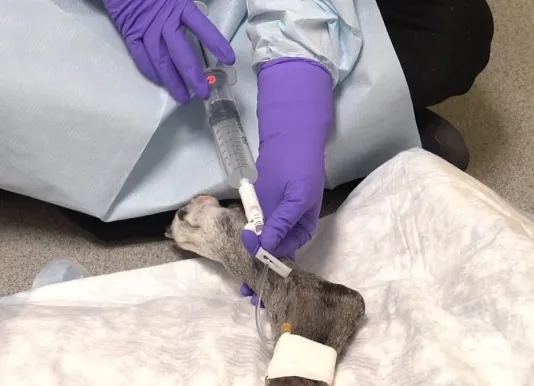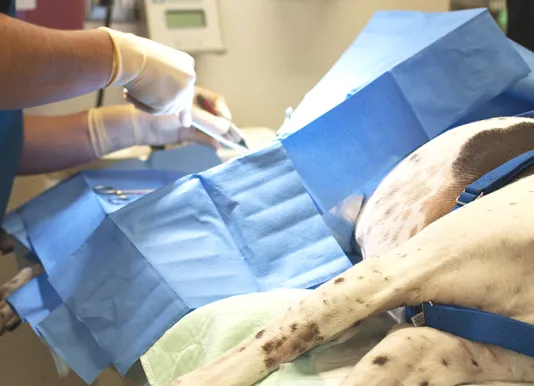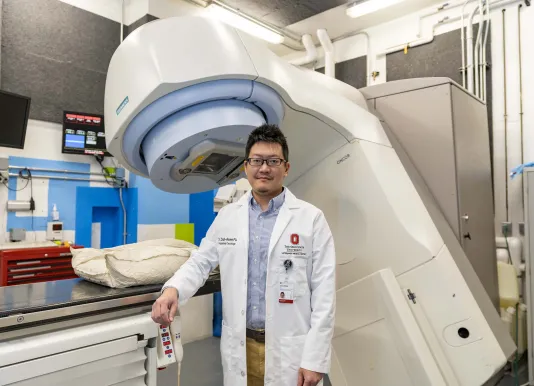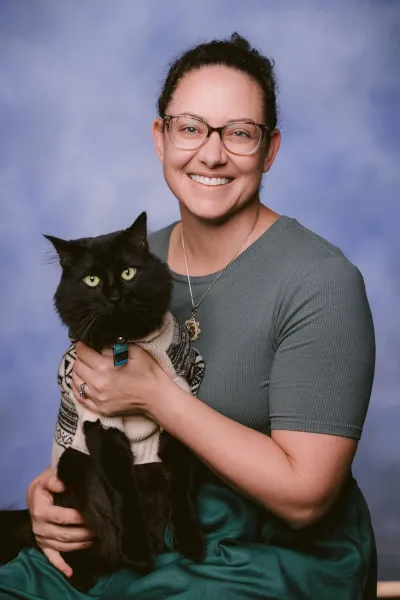- Services
- Integrated Oncology Services
Integrated Oncology Services
The Integrated Oncology Services at Ohio State’s Veterinary Medical Center is comprised of a team of cancer doctors with specialties in medical, surgical, and radiation oncology. Working together - and with you and your veterinarian - from initial consultation and diagnosis, through the prescription and implementation of a treatment plan.
In this section
Hours & Appointment Scheduling
Patient visits are by appointment only. Please call (614) 247-0583.
Email: osuvet.oncology@osu.edu
Office hours: 8:00 a.m.-4:30 p.m.
- Monday - Friday: Chemotherapy appointments and re-checks
- Monday - Thursday: New patients
Emergencies
- Emergencies will be seen as scheduled through referring veterinarians. For an appointment, please call (614) 247-0583.
- After hour and weekend emergencies: (614) 292-3551.
Common Cancer Types
The Integrated Oncology Service treats many types of cancer. Some of the most common are lymphoma, osteosarcoma, transitional cell carcinoma, mammary gland carcinoma, mast cell tumor, melanoma, fibrosarcoma and leukemia, among others. We also evaluate and treat patients with hematologic diseases such as immune-mediated anemia, immune-mediated thrombocytopenia, and bone marrow disorders.
We will do our best to discuss the tumor type that your dog has, the treatment options that are available, the prognosis, and the cost associated with treatment.
Lymphoma (lymphosarcoma, LSA) is a cancer of the lymphocytes (white blood cells) most commonly originating in the lymph nodes (lymph glands), although it may affect any organ, including spleen, liver, intestines, and skin. Fortunately, most (~90%) patients treated with combination chemotherapy undergo clinical remission (no visible evidence of cancer) for extended periods of time.
Mammary tumors in dogs are extremely common and approximately 50% of them are malignant. Mammary tumors are more common in intact than in spayed females. In fact, spaying before the first or second heat cycle significantly reduces the risk of developing mammary tumors in dogs. The median age for a presentation is 10 - 11 years. Dogs fed a high-fat diet or who are overweight at one year of age are at increased risk of developing mammary gland tumors. Appropriate early treatment, even if the tumor is malignant, is often curative.
Soft tissue sarcomas (STSs) consist of a variety of tumors that arise from mesenchymal cells. Tumors included in this group are fibrosarcomas, peripheral nerve sheath tumors, and hemangiopericytomas. They typically appear as firm, subcutaneous (under the skin) masses, which may be located on the extremities, trunk, or head and neck. They usually are slow-growing tumors but may also come up quite quickly. These tumors are locally invasive and are not likely to go to other sites (metastasize).
Lymphoma is a cancer of the lymphocytes (white blood cells) most commonly occurring in the gastrointestinal tract or mediastinum (chest) of cats, although it may affect any organ, including lymph nodes, spleen, liver, kidneys, nose, and skin. Fortunately, most patients treated with combination chemotherapy go into clinical remission (no visible evidence of cancer) for extended periods of time.
Quality of life for cats with lymphoma on chemotherapy, as judged by the owners, usually is excellent.
Mammary tumors are among the most common tumors in the cat; Domestic Shorthairs and Siamese may have higher incidence rates than other breeds. The mean age at presentation is 10 to 12 years. Most affected cats are intact females; however, the disease is occasionally seen in spayed females and, rarely, in male cats. Several reports have documented a strong association between the use of contraceptives and the development of benign or malignant mammary masses in cats.
Surgery is the most widely used treatment for mammary neoplasms in cats; it is used alone or in combination with chemotherapy. Radical mastectomy (i.e., removal of all glands on the affected side) is the surgical method of choice because it significantly reduces the chance of local tumor recurrence. Early diagnosis and treatment is vital in cats with mammary tumors.
Injection-site sarcomas (ISS) are also referred to as fibrosarcoma. They are mesenchymal tumors that are locally invasive and have a low to moderate chance of spreading to other sites (metastases). These tumors develop in areas where cats have received injections, mainly vaccines. Common locations include the interscapular (between the shoulder blades) region, the flank region, and the rear legs. These tumors tend to be firm, subcutaneous masses that are not freely movable.
If you have concerns or questions about a lump on your cat, we recommend that you consult with your veterinarian. If your cat has been diagnosed with an ISS, treatment options may include a combination of surgery, radiation therapy, and chemotherapy; consultation with an oncologist is advised.
Mast cell tumors (MCTs) are one of the most common skin tumors in dogs. Although some breeds are predisposed, such as Boxers and Golden Retrievers, MCTs can develop in dogs of any breed. Middle-aged to older dogs have a higher risk of developing MCTs, but young dogs can also be affected.
The treatment is variable depending on the histopathologic grade and extent of disease. When MCTs can't be surgically removed, radiation therapy is recommended, although in some cases chemotherapy may have similar effects.
Service Highlights
-
Holistic approach to evaluating, diagnosing and treating patients
-
Superior level of advanced care and experience in managing pets with advanced and metastatic cancer
-
Administration of comprehensive, multimodal treatment plans
-
Access to investigational clinical studies for specific diseases or tumors
-
Streamlining and optimizing owner experience: receiving input and information from all relevant specialists during a single visit, rather than having to visit and consult separately with each service (medicine, surgery and radiology.)
-
Superior level of experience in routinely managing animals with hematological (blood) disorders
-
Empowering pet owners with a comprehensive understanding of their pets' diagnosis and best course of treatment, to help minimize fear, confusion and uncertainty frequently associated with a cancer diagnosis
Oncology Specialty Services
Our team of world-class, board-certified veterinary medical, surgical and radiation oncologists, residents and veterinary technicians are here to provide your dogs, cats, equine and farm animals with the most advanced and comprehensive care and treatment options to ensure their best possible quality of life. Our integrated oncology team also consists of an Integrated Oncology Service Client Liaison to assist with scheduling, messaging and case coordination; and a certified social worker/counselor trained to assist with decision making and, when necessary, to provide family bereavement support.
What to Expect
Clients who are visiting the Integrated Oncology Service for the first time with their pet should expect to spend several hours or more with us. This is because many of our first-time patients require diagnostic tests that either take time to obtain the results, such as blood tests, or must be scheduled with other services in the medical center, such as radiographs and ultrasounds.
Owners will be greeted by the fourth-year veterinary student assigned to your pet's case. The student will take an initial history and report back to the assigned clinician. Based on the individual case, a clinician from the Integrated Oncology Service - with a focus either surgical, medical or radiation oncology - will initiate the consultation. Once daily, the integrated team of cancer specialists will meet to discuss each patient and review pertinent diagnostics in detail to design treatment plans that are personalized and tailored to the individual family. The treatment plan may or may not involve all three oncology disciplines.
As owner, you are a key member of your pets' oncology care team. Our goal is to provide an environment where every family feels supported throughout each stage of their pet's cancer journey. The clinician assigned to lead the case will discuss your pet's condition in detail, answer any questions you may have and work together with you and your veterinarian, as well as other members of the Integrated Oncology team to implement a personalized treatment plan to your satisfaction as the pet owner.
Excellent experience! Grateful for extended hours for emergency care on weekends. Thorough exams and detailed explanations. High comfort level my pet is cared for compassionately.
Care Team

Jeilene Hambly

Rachel Wong

Lauren Cruse

Lauren Cuevas

Kristi Groll

Karen Henle

Mary Ibanez

Kristin Martin

Brian Skock
Clinical Trials
The Integrated Oncology service is often recruiting patients for related studies for which your pet may be eligible. If you have any questions regarding your pet's eligibility, please contact the Blue Buffalo Clinical Trials Office (cvm-clinicaltrials@osu.edu).
For a listing of current trials please click here.












